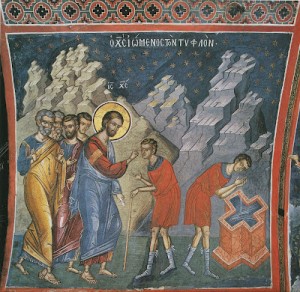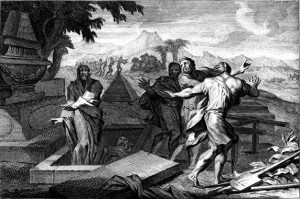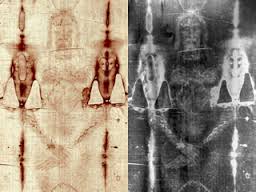Some might claim that Catholic teaching on relics and Sacramentals is unbiblical. Really?
Check out these biblical passages:

“So they cast the dead man into the grave of Elisha, and everyone went off. But when the man came in contact with the BONES of Elisha, he came back to life and rose to his feet” (2 Kgs. 13:21).
“They even carried the sick out into the streets and laid them on cots and pallets, so that when Peter came by at least his SHADOW might fall on any one of them. Also the people from the cities in the vicinity of Jerusalem were coming together, bringing people who were sick or afflicted with unclean spirits, and they were all being healed” (Acts 5:15).

OIL – see James 5:14-15
WATER – see 2 Kings 5:14
SACRAMENTALISM (Quoted from Dave Armstrong’s “One Minute Apologist“)
Objection: Matter cannot convey grace. Sacramentalism and relics are unbiblical magic
The Bible teaches that grace and salvation come through the spirit (Jn. 6:63), not through “holy objects”
Initial reply : The Incarnation of Jesus “raised” matter, and His death on the cross was intensely physical. Protestants often speak of “the blood” (Rev. 5:9; Eph. 1:7; Col. 1:14; Heb. 9:12; 1 Pet. 1:2; 1 Jn. 1:7), which is but one of many examples of sacramentalism.
Extensive reply

Catholics believe in seven sacraments: all of which are established on the basis of extensive biblical evidences: 1) The Eucharist: Lk. 22:19-20; Jn 6:53-58; 1 Cor. 11:23-30; 2) Baptism: Matt. 28:19; Acts 2:38, 22:16; 3) Penance and Reconciliation: Matt. 16:19; Jn 20:23; 1 Cor. 5:3-5 with 2 Cor. 2:6-11; 4) Confirmation: Acts 8:14-17, 19:1-6; Eph. 1:13; 5) Anointing of the Sick: Mk. 6:13; Acts 9:17-18; Jas. 5:14-15; 6) Ordination: Mt. 18:18; 1 Tim. 4:14; 2 Tim. 1:6; 7) Matrimony: Matt. 5:31-32, 19:1-9; Eph. 5:21-33.

2 Kings 13:20-21: So Eli’sha died, and they buried him. Now bands of Moabites used to invade the land in the spring of the year. And as a man was being buried, lo, a marauding band was seen and the man was cast into the grave of Eli’sha; and as soon as the man touched the bones of Eli’sha, he revived, and stood on his feet.
Examples of second-class relics (objects that came into contact with holy people) are also clearly found in passages about the prophet Elijah’s mantle, which parted the Jordan River (2 Kings 2:11-14), and Peter’s shadow (Acts 5:15-16) and Paul’s handkerchief (Acts 19:11-12), used by God to heal sick people and to cast out demons. If all of this is “magic,” then it is a sort of “magic” directly sanctioned by God Himself.
Objection
Protestants can agree with some of this. What cannot be found in the Bible, however, is the excessive veneration of relics. This goes too far, and is idolatry. We can remember the deeds of great heroes of the faith (Acts 7; Hebrews 11) and thank God for them, but we shouldn’t get into worshiping bones or pieces of hair and so forth, or go on pilgrimages to “holy places.” That’s too much like paganism or heathenism and adds nothing to our spiritual life. All places are equally “holy.”
Reply to Objection
If matter can indeed convey grace and blessing, according to the Bible, then we can give glory to God for what He has done with lowly matter by venerating (not worshiping) even now-inanimate objects. Protestants themselves would not, for example, think that the birthplace of Jesus in Bethlehem or the hill where He died on the cross or His tomb, from which He rose from the dead, are merely rocks and dirt like any other rocks and dirt. In their own way they do indeed venerate and honor them. If the physical location were so irrelevant, why visit it at all; why not simply ponder Jerusalem and Israel in their heads, in “spirit.”

St. Thomas Aquinas (1225-1274)
The death of Christ is the universal cause of man’s salvation: but a universal cause has to be applied to particular effects. Thus it was found necessary for certain remedies to be administered to men by way of bringing Christ’s death into proximate connection with them. Such remedies are the Sacraments of the Church.

Hereby is excluded the error of certain heretics, who wish all visible sacramental signs swept away; and no wonder, for they take all visible things to be of their own nature evil, and the work of an evil author. These visible sacramental signs are the instruments of a God Incarnate and Crucified. (Summa Contra Gentiles, IV, 56: “Of the Need of Sacraments”)


